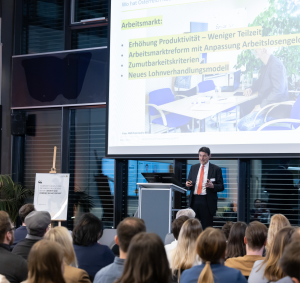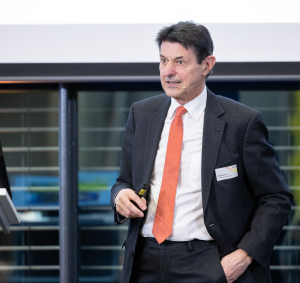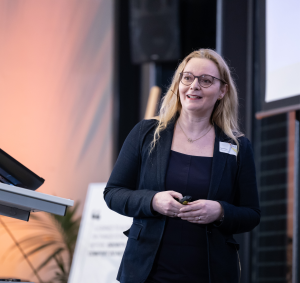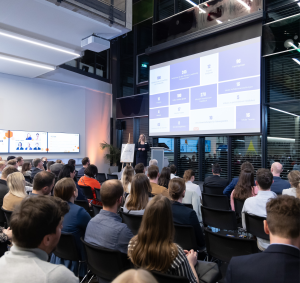On 27 March 2025, the event ‘No risk, no reach: Marketing in times of uncertainty!’ took place at CAMPUS 02 as part of the ‘Best of Marketing and Sales’ event series. Around 100 guests accepted the invitation from Head of Department Ursula Haas-Kotzegger to gain exciting insights into current economic challenges and opportunities.
Austria's economic challenges - A wake-up call for change
In the first presentation, ‘How can we regain our competitiveness!’, Peter Brezinschek, financial market expert and former chief analyst at Raiffeisenbank, gave a concise overview of the economic situation in Austria. The last few years have been characterised by falling growth rates, a weakening labour market and geopolitical uncertainties. However, Brezinschek drew a clear conclusion: Austria's future lies not only in analysing external challenges, but above all in the willingness to initiate internal changes.
He pointed out that the country has so far failed to capitalise on opportunities in three key areas: The labour market, tax policy and government efficiency. A reform course in these areas could not only stabilise the country economically, but also put it back on course for growth. He particularly emphasised the importance of reducing the tax burden and streamlining bureaucracy in order to motivate companies and skilled workers to make a long-term commitment to Austria.
Conclusion: Now is the time for far-reaching reforms to put Austria back on the path to growth.
Bahlsen: A history of tradition, change and a strong corporate culture
Eva Aichmaier took us on a journey through the history of a company that has been successful for over 135 years.
Bahlsen is a traditional company that has never lost its course in a world full of uncertainty and constant change. Each generation has risen to the challenges of its time - and the secret of its success lies in the core values that are deeply rooted in the company's DNA. Aichmaier speaks of the combination of quality, sustainability and innovative spirit that has always characterised Bahlsen. Values such as curiosity, courage and cooperation are not just empty phrases, but are lived in the daily work of every single employee. This value-orientated corporate culture makes Bahlsen not only resilient in times of crisis, but also innovative and adaptable.
One impressive example of this is the company's sustainability strategy: Bahlsen has been sourcing wheat from within a radius of 300 kilometres of its production facilities for decades - a decision that not only strengthens the local economy, but also sends a strong signal for sustainability in practice, long before this topic gained global significance.
However, Bahlsen's true strength lies in its employee culture. At a time when many companies are trimming their workforces to cut costs, Bahlsen is focussing on individual support and motivation. Targeted coaching has encouraged a change in mindset that has not only increased innovative strength, but also team spirit and a sense of responsibility within the company. At Bahlsen, we understand that we are stronger together - and every single employee can feel that.
Bahlsen's core message is clear: stability does not come from standing still, but from consciously combining tradition and change. And so one thing remains certain: even in turbulent times, a chocolate biscuit can sweeten everyday life.
Panel discussion: Success strategies in times of crisis
The concluding panel discussion with Eva Aichmaier, Peter Brezinschek, Harald Riedlhuber (PAYER Group), Georg Jungwirth and Dietmar Kappel (both CAMPUS 02) delved deeper into the topics of the presentations and brought important insights to light. Under the moderation of Stephan Heckmann, the experts discussed how companies can remain successful even in economically uncertain times.
The most important findings from the discussion were
-
Take crises as an opportunity: Companies that are successful in the long term use times of crisis to develop further. Instead of simply focusing on cutbacks, companies should make targeted investments in research & development, employees and processes.
-
Promoting long-term thinking: The success of family businesses and long-term companies often lies in their ability to think and act across generations.
-
Anti-cyclical behaviour: If the market is going in a certain direction, it can be wise to swim against the tide. Investments in marketing, sales and innovation are particularly valuable in times of crisis.
-
Motivation and corporate culture: A strong team that is motivated and committed can achieve great things even in difficult times.
-
Investing in innovation: Companies that invest in strategic innovations, even in times of crisis, secure their market leadership in the long term.
Conclusion: Change as a success factor
The event impressively demonstrated that economic uncertainties not only present challenges, but also great opportunities. Companies and decision-makers are now called upon to pave the way to a successful future with strategic reforms, courageous decisions and a strong corporate culture.
The discussion made this clear: Those who are prepared to adapt, invest and break new ground will be successful in the long term - true to the motto of the event: No risk, no reach!








